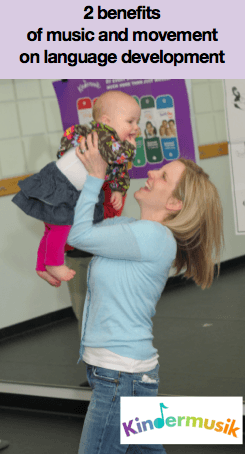Lifting. Squatting. Twirling. Bending. Whew! Sometimes Kindermusik class feels more like a workout than, well, a workout. Okay, maybe not P90x, but still! While a parent works out muscles each week, young children build early language skills through music and movement activities.
2 benefits of music and movement on language development
- Pairing the word with the movement helps babies and young children understand the concept. Pre-readers rely
 almost exclusively on what they hear in order to acquire language. Children’s brains make a connection based on what they experience (being lifted high or twirling around) and hear (“up” or “twirl”). So, when a parent of caregiver lifts a child high “up, up in the sky” or “twirls around like a leaf” while singing the songs in Kindermusik class, young children learn the word and understand the concept. Later, children will discover those words correspond to marks on a page which eventually leads to letter recognition and reading.
almost exclusively on what they hear in order to acquire language. Children’s brains make a connection based on what they experience (being lifted high or twirling around) and hear (“up” or “twirl”). So, when a parent of caregiver lifts a child high “up, up in the sky” or “twirls around like a leaf” while singing the songs in Kindermusik class, young children learn the word and understand the concept. Later, children will discover those words correspond to marks on a page which eventually leads to letter recognition and reading. - Signing with hearing children boosts their communication skills. We use sign language throughout our music classes for babies. Using signs for words such as HELLO, GOODBYE, MORE, and STOP throughout class—and then later at home—supports communication and language development and even improves confidence and self-esteem. Plus, new research shows encouraging babies and toddlers to use gestures, such as sign language, helps in speech and cognitive development.
Parenting Tip: Play that fun-key music! Listen and move to music that combines key vocabulary with a movement or activity. Try favorite Kindermusik songs from class. Also use sign language for key words throughout the day. For example, sign MORE to ask if your child wants MORE fruit or HELLO when your little one wakes up from a nap.
 Come experience for yourself the benefits of music! Contact a local Kindermusik educator and visit a class.
Come experience for yourself the benefits of music! Contact a local Kindermusik educator and visit a class.
Contributed by Lisa Camino Rowell, a freelance writer living in the Atlanta area.



